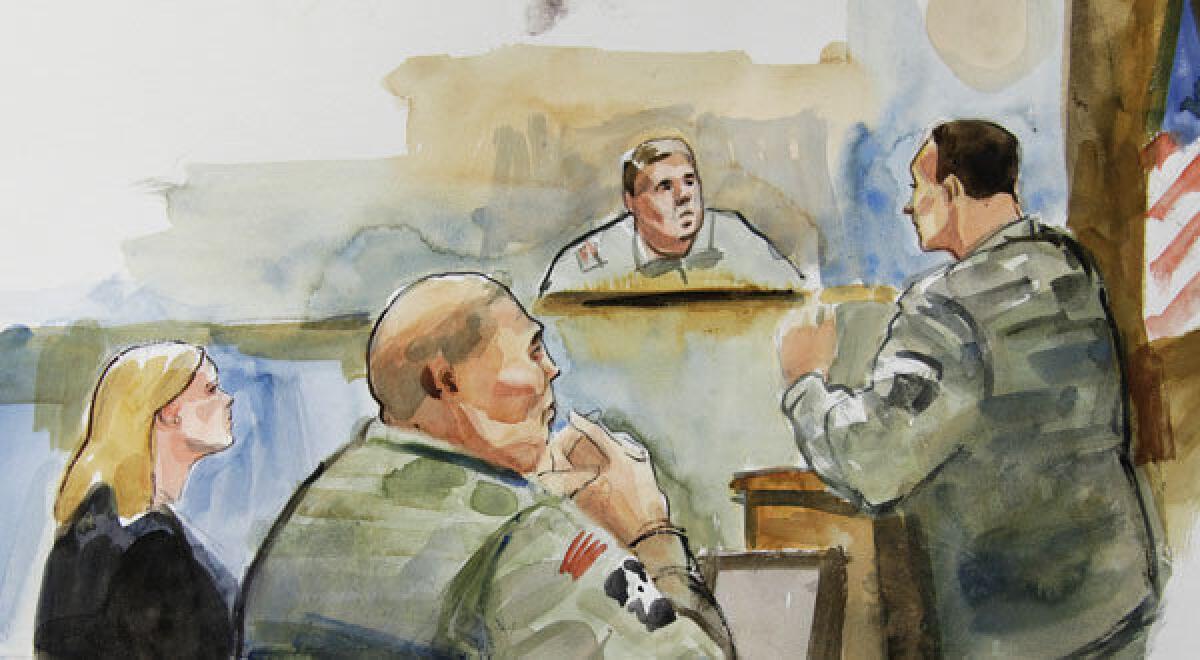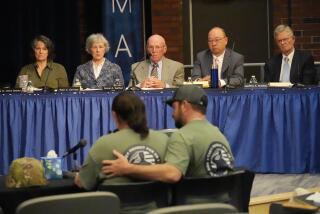Army seeks death for Sgt. Robert Bales in Afghan shooting rampage

SEATTLE -- The commanders at Joint Base Lewis-McChord have decided to refer the case against Army Staff Sgt. Robert Bales for a general court-martial on charges that he murdered 16 civilians in a late-night shooting rampage outside a remote Army outpost in southern Afghanistan.
Army officials also announced they would seek the death penalty against Bales, a veteran of four combat deployments who is also charged with wounding six other civilians after a night of drinking on top of steroid use at what defense lawyers say was a dysfunctional special operations outpost.
The report from investigating officer Col. Lee Deneke was not made public, but attorneys said the commanding officer’s referral matched Deneke’s own recommendation after a weeklong preliminary hearing in November, during which a parade of witnesses testified about what happened in the early morning hours of March 11 outside Camp Belambay.
DOCUMENT: Court martial statement
Bales allegedly was seen returning to the base after the shootings with his clothing, boots and weapon covered with blood; DNA evidence provided a match between that blood and blood found at one of the shooting scenes.
Additionally, Bales’ fellow soldiers testified that the 39-year-old staff sergeant as much as admitted that he had killed people that night outside of the base, though they initially didn’t believe him.
“He said he’d just been to Al-Kozai, shot some people ... shot some military-age males. And I said, “No you didn’t,’ ” Sgt. Jason McLaughlin testified, adding that Bales told him he was heading to the second village where attacks occurred, Najiban, and would be back at 5 a.m.
Defense lawyers say Bales clearly wasn’t in his right mind. He had not only suffered a concussive head injury in an earlier incident, but was suffering from post-traumatic stress disorder from several previous emotional incidents in which he had been involved -- a colleague’s legs were blown off by a homemade bomb shortly before the shootings.
In addition, they said, Bales was called to duty at the remote special operations base and found a culture of widespread alcohol use. He had, with the encouragement of special forces troops at the base, been taking steroids, which have been linked to incidents of aggression, and was also supplied with alcohol by the special forces troops.
“I think the general’s decision is understandable, but totally irresponsible. I think the Army is not taking responsibility for the soldiers in general, and ... is trying to take the focus off the considerable errors they made as far as Sgt. Bales is concerned, as far as a lot of other soldiers are concerned: It’s a system failure,” Bales’ civilian defense lawyer, John Henry Browne, told the Los Angeles Times.
“The Army is trying to deflect criticism by not taking responsibility in my view, and it’s a shame,” Browne said.
Bales’ wife, Kari, said her wish from the start was for her husband to obtain a fair trial, and emphasized that he must be presumed innocent until all the evidence comes out.
“I no longer know if a fair trial for Bob is possible, but it very much is my hope, and I will have faith,” she said in a statement.
“My husband is an American soldier. He is a citizen of the USA, and he is very much loved by me and by our children,” she added. “I am so happy that my children and I can visit Bob every weekend and that for a few hours, I can see and feel the love that flows between my children and their father.”
A legal dispute has delayed an official mental health evaluation for Bales, known as a sanity board. His civilian defense team is challenging standard military legal procedures in which Army prosecutors are given access to the psychiatrists’ report, even before the defense announces any plans to assert an insanity defense.
“The military system is very unique in the way they do that. That’s not the way it’s done in the civilian world. It is extremely damaging to his due process rights, and it’s a big problem,” said Emma Scanlan, civilian co-counsel for Bales.
The defense team still has not decided whether it will attempt to have Bales found not guilty by a military jury by reason of insanity -- a verdict that is almost never returned in military cases.
Instead, they may seek to raise Bales’ mental health issues as mitigation during sentencing in order to take the death penalty off the table.
But Scanlan said it may not get that far.
“The [prosecution] team has to prove beyond reasonable doubt that he acted with premeditated intent,” she said. “That’s a high burden, considering the situation here.”
Military prosecutors do not comment on ongoing cases. Lt. Col. Gary Dangerfield, spokesman at Joint Base Lewis-McChord, said the next step is for Bales to be arraigned on the charges. No date has been set.
ALSO:
Sandy Hook: Firefighters salute Daniel, 7
FBI stays mostly mum about Sikh temple shooter
Authorities identify suspect, victims in Colorado shootings
More to Read
Sign up for Essential California
The most important California stories and recommendations in your inbox every morning.
You may occasionally receive promotional content from the Los Angeles Times.










